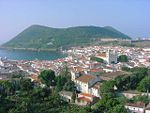Cemetery of Anchors: Difference between revisions
removed Category:Angra do Heroísmo; added Category:Buildings and structures in Angra do Heroísmo using HotCat |
Expanding article |
||
| Line 1: | Line 1: | ||
The '''Cemetery of Anchors''' ({{lang-pt|Cemitério das Âncoras}}) is a subaquatic archaeological site, situated within the [[Bay of Angra]], in the [[Freguesia (Portugal)|civil parish]] of [[Sé (Angra do Heroísmo)|Sé]], [[concelho|municipality]] of [[Angra do Heroísmo]], on the [[Portugal|Portuguese]] island of [[Terceira]], in the [[Azores]]. |
|||
{{Expand Portuguese|topic=geo|date=September 2010|Cemitério das Âncoras}} |
|||
Its limits extend from the Fort of São Benedito until the eastern edge of [[Monte Brasil]], along the second line of defensive walls that protected the mountain, for approximately {{convert|500|m|ft}}. The depth at which the artefacts and ruins exist varies from {{convert|22|m|ft}} (in an area of rocks) until {{convert|32|m|ft}} (in an area of sand). |
|||
'''Cemitério das Âncoras''' is a landmark in the [[Azores]]. It is located in [[Angra do Heroísmo]], on the island of [[Terceira Island|Terceira]]. |
|||
Divers can reach the site by boat, and the area is classified as a medium scale of difficulty, owing to the depths involved. Although maritime currents are not strong, the area is identified by surface buoys: the area falls within the port-control zone associated with the ''Porto das Pipas'', an is conditioned by boat movements. |
|||
| ⚫ | |||
It is possible to observe a variety of anchors, from various periods of history, but specifically between the 16th and 20th century. There are approximately thirty examples of anchors from different boats from these periods. Many of the objects in the bay are testaments to past shipping accidents, committed by pilots that were unfamiliar with the characteristics of the bay. In many cases those pilots, always desperate to avoid shipwrecks would cut their lines in an attempt to find the open sea. By doing this, they hoped to avoid the dangerous southern or southeastern winds, locally known as "''ventos carpinteiro''" (''carpenter winds''), since after shipwrecking the ships' wood would be reused by locals as building materials. |
|||
{{coord missing|Portugal}} |
|||
In addition to the archeological interest of the subaquatic park, the area is also an important registry of oceanic species and marine flora. From a medium depth of {{convert|15|m|ft}} to approximately {{convert|35|m|ft}}, the bottom of the bay includes rock and sand. The conditions provide useful characteristics for underwater photography, including geological features and maritime species. Since it is not considered a dangerous local area, diving both in the day and evening are possible. |
|||
| ⚫ | |||
| ⚫ | |||
| ⚫ | |||
{{Coord|38|39|0.23|N|27|13|9.36|W|display=title}} |
|||
{{Azores-geo-stub}} |
|||
{{Portugal-struct-stub}} |
|||
| ⚫ | |||
| ⚫ | |||
Revision as of 00:00, 1 April 2014
The Cemetery of Anchors (Template:Lang-pt) is a subaquatic archaeological site, situated within the Bay of Angra, in the civil parish of Sé, municipality of Angra do Heroísmo, on the Portuguese island of Terceira, in the Azores.
Its limits extend from the Fort of São Benedito until the eastern edge of Monte Brasil, along the second line of defensive walls that protected the mountain, for approximately 500 metres (1,600 ft). The depth at which the artefacts and ruins exist varies from 22 metres (72 ft) (in an area of rocks) until 32 metres (105 ft) (in an area of sand).
Divers can reach the site by boat, and the area is classified as a medium scale of difficulty, owing to the depths involved. Although maritime currents are not strong, the area is identified by surface buoys: the area falls within the port-control zone associated with the Porto das Pipas, an is conditioned by boat movements.
It is possible to observe a variety of anchors, from various periods of history, but specifically between the 16th and 20th century. There are approximately thirty examples of anchors from different boats from these periods. Many of the objects in the bay are testaments to past shipping accidents, committed by pilots that were unfamiliar with the characteristics of the bay. In many cases those pilots, always desperate to avoid shipwrecks would cut their lines in an attempt to find the open sea. By doing this, they hoped to avoid the dangerous southern or southeastern winds, locally known as "ventos carpinteiro" (carpenter winds), since after shipwrecking the ships' wood would be reused by locals as building materials.
In addition to the archeological interest of the subaquatic park, the area is also an important registry of oceanic species and marine flora. From a medium depth of 15 metres (49 ft) to approximately 35 metres (115 ft), the bottom of the bay includes rock and sand. The conditions provide useful characteristics for underwater photography, including geological features and maritime species. Since it is not considered a dangerous local area, diving both in the day and evening are possible.

